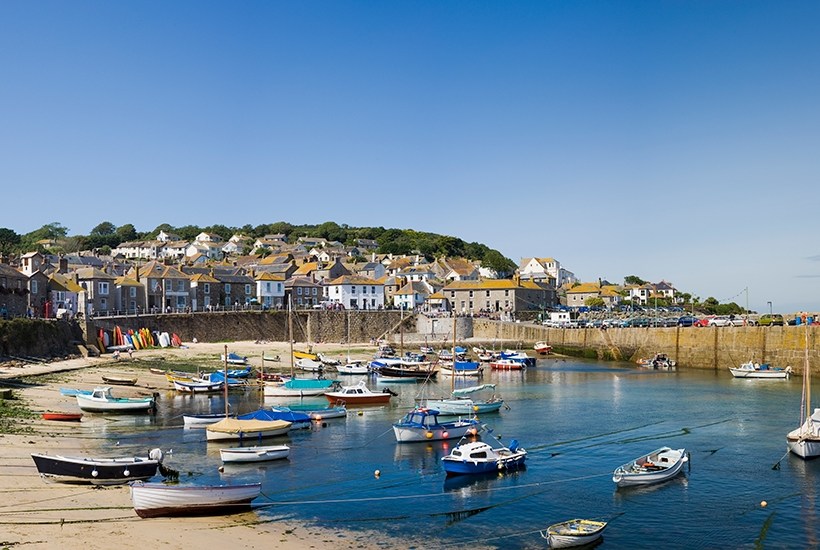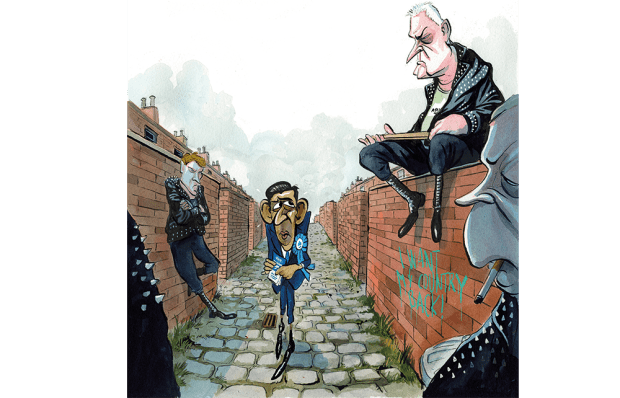It was sunny on Monday so I took the children swimming in Mousehole harbour. It was almost empty but a woman sanding a boat on the quayside scowled at me. She couldn’t hear the children’s Cornish accents, which might tell her that I live here.
There have been tensions for years between native Cornish and the incomers who buy houses and drape them with nautical-themed junk. With pandemic, they have developed into hostility. A sign appeared on the bus stop in Mousehole: ‘If you have travelled from a hotspot area outside Cornwall (like London) you are putting vulnerable people in this village at risk of death. Please come back when the virus peak has passed, until then travel is selfish and unkind.’ But it was grey and windy that day, and the sign blew away.
Tourism brings £1.8 billion a year to Cornwall and employs one in five people. Tin mining has gone, and fishing is declining, so the Cornish usually greet incomers — ‘emmets’ or ‘ants’ — with phlegmatic grace. But not when there is a pandemic, an ageing population (Cornwall is beloved by retirees), widespread ill-health (it is as normal to see a mobility scooter in Penzance on a Saturday morning as it is to see a person walking), and only one major hospital at Treliske. Cornwall has 15 critical care beds to serve a population of more than half a million. They had to release in-patients after going over capacity in January. They won’t confirm the numbers of critical care beds available now. They don’t want to frighten people.
It’s too late for that. It is widely believed that there is a case of coronavirus in Penzance, and another in St Just, the most westerly town in Britain. As I write, there are at least 25 cases and seven deaths. It is also widely believed that the root of infection is second-home owners.
Still, we do our best. Grocers deliver to vulnerable people for free. We share information on where food is plentiful: Sainsbury’s is still out of flour — what are they doing with it? — but there is plenty at Thornes Fruit and Veg in Long Rock. There is fear but not despair. Cornwall has known misery before. She is used to relying on herself. In 1595 the Spanish landed and burned Newlyn, Mousehole and Penzance. By the time the militia arrived from Plymouth, they had sailed away.
When the schools closed, we believed that people wouldn’t come for Easter holidays. The leader of Cornwall Council, Visit Cornwall and the MP for St Austell and Newquay asked people not to come. So did the professional mermaid Laura Evans, but that counts for nothing.
Photographs of long queues on the A30 were published, with aghast comments. Mark Jenkin, who last month won the Bafta for outstanding British debut for Bait, a film about gentrification in Cornwall, posted: ‘Please don’t come to Cornwall. We don’t have the resources for us, let alone you.’ Bait has a dark ending, but any sequel may be darker. Gentrification has not, so far, led to mass death; it is more usually grumbling and looks. Bait’s star Ed Rowe said: ‘Holidaying in Cornwall for the foreseeable future under the current circumstances could have a catastrophic impact for the people that live and work here.’ He quoted a doctor at Treliske who simply said: ‘Don’t come to Cornwall.’
The holiday cottages are largely empty; responsible owners asked guests to come later in the year, despite the impact on their business. Holiday parks were pressured to close, sometimes with death threats. But the owners of second homes are here, ordering hundreds of pounds of groceries for delivery. I went to St Buryan, where Straw Dogs, a very rude film about Cornish violence to incomers starring Dustin Hoffman, was filmed, to buy sausages at the farm shop. I saw Londoners in clean Barbours and shiny Land Rovers staring at frozen pasties. On the way home I saw a Bentley. I wondered if there were pasties in the boot.
A Mousehole resident told me — and that he spoke to me, a person who has only lived here for three years, is by itself unusual — ‘It’s busier than it would normally be at this time, out and about today there are strange faces using the shop and the deli. It’s the same in St Ives. I overheard one woman say on the phone she hadn’t realised the hostility. The long-term locals are really quite upset, they are trying to protect their own health. I think they are feeling threatened.’
It was worse in St Just, but it is a tough place, once a mining boom town with a population, for a while, larger than Manchester. Stories which I think are lies, but they don’t bother to deny, tell that they throw unpleasant incomers down mineshafts, but only after a proper warning has been ignored. They are hardy in St Just, even for the Cornish.
I was told that a resident approached a second-home owner: ‘Have you seen the guidance on non-essential travel?’
‘No, so what?’
‘Well, you’re not really supposed to be here.’
‘It’s my bloody house.’
‘And it’s our fucking hospital.’
Is that a proper warning?
Now they are threatening not to sell food to the emmets. ‘They will be lynched,’ said the local butcher calmly, but in the end, there was no time for lynching. The duchy is in lockdown, but the Isles of Scilly acted early, because they are used to peril. Four British warships and 1,300 men were lost there in 1707 with their admiral Sir Cloudesley Shovell; the pub dog at the Admiral Benbow in Penzance is named for him. The Isles didn’t wait for the government. The Scillonian, which sails daily, brought college kids and local residents home before the announcement of lockdown on Monday. Others were not allowed to board.
Got something to add? Join the discussion and comment below.
Get 10 issues for just $10
Subscribe to The Spectator Australia today for the next 10 magazine issues, plus full online access, for just $10.
You might disagree with half of it, but you’ll enjoy reading all of it. Try your first month for free, then just $2 a week for the remainder of your first year.















Comments
Don't miss out
Join the conversation with other Spectator Australia readers. Subscribe to leave a comment.
SUBSCRIBEAlready a subscriber? Log in